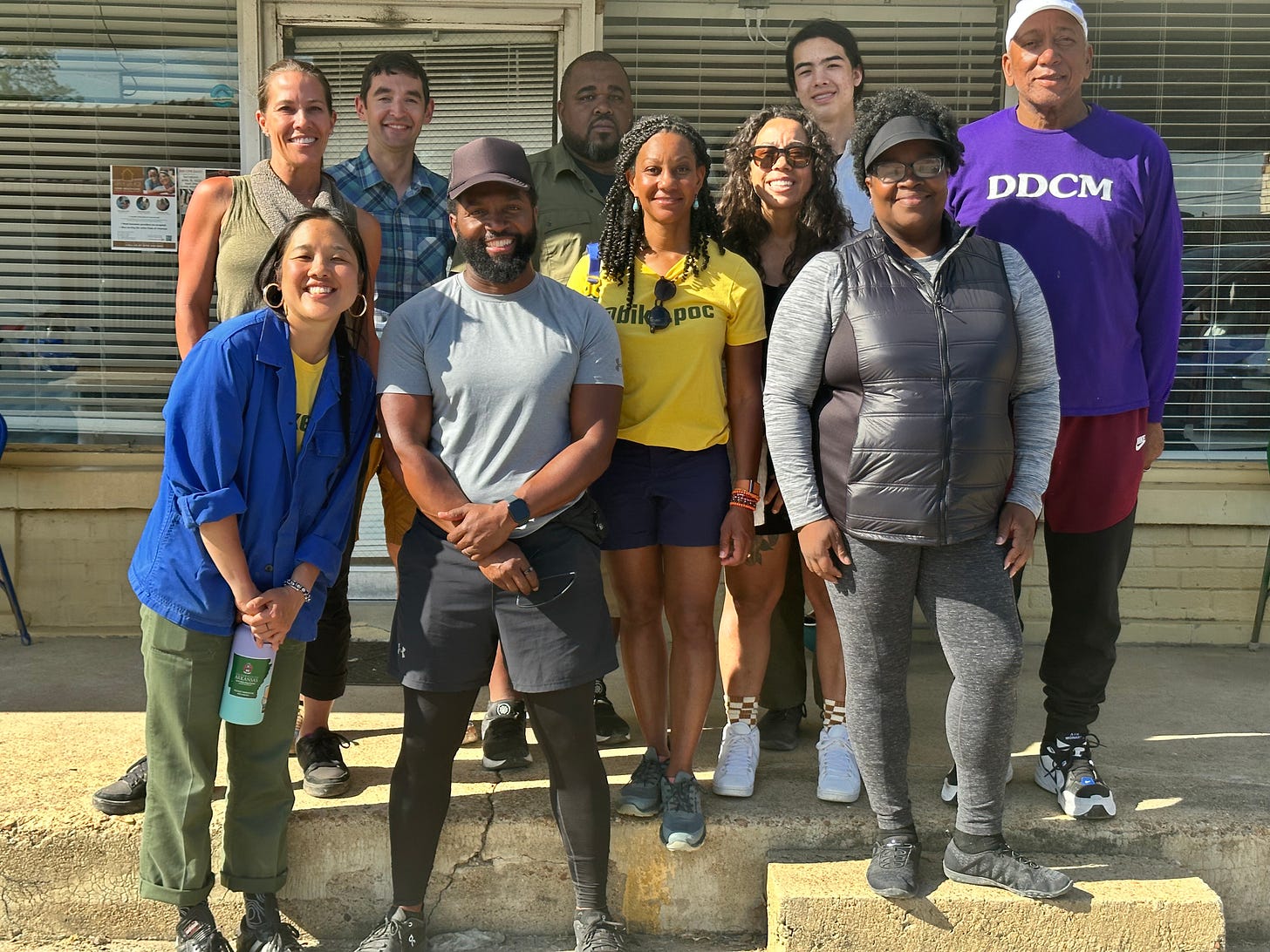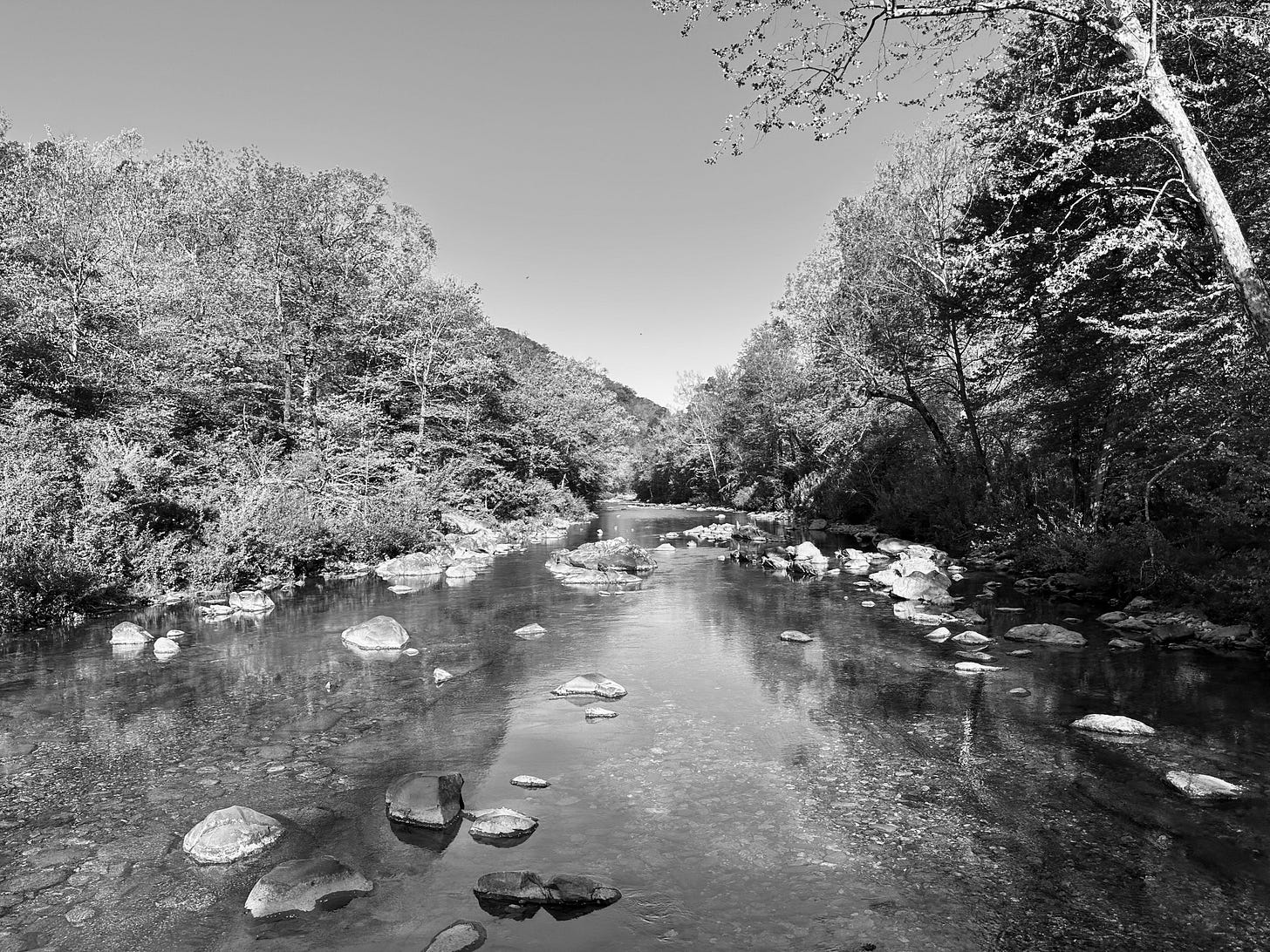Civil Unraveling and other Tales from the American South
Plus an AI panelist goes to Coachella
Me in Elaine, Arkansas this past weekend with the town’s mayor (in black visor), leaders of BikePOC (to my left and right) and others from the area
Hi you,
As usual you can read this newsletter in full in Puck. In this open edition I share the personal note and part of the full essay.
I’m at it again, on the road, making more television. I’m writing you now from Hot Springs, Arkansas, where I have spent the past week flying, fishing, sport shooting and more. I’ll share a more poignant reflection on my time here below, but for now I’ll just say that the people are really nice, the landscape is epic (I literally went frolicking in a meadow), but the whole cheese dip thing isn’t for me.
We are nearing the end of our current season of the How To Citizen podcast and just published an inspiring conversation with Golden State Warriors Coach Steve Kerr and two other leaders in college athletics on the connection between sports and active citizenship. If you’re exhausted with stories on the revocation of various rights and the seemingly imminent collapse of society, I promise this will boost your mood.
It’s also Coachella week back in Southern California. I’ve never been to the music festival, but I have taken part in the Mobius Experience conference which happens between the weekends and focuses on art, politics, and culture. Last year I moderated a panel on “CRT or NFTs: what should we be teaching our kids” (an easy enough answer in hindsight), and this year there’s a conversation about climate change and water in the desert that will involve an A.I. persona created specifically for that purpose. If you’re in the Coachella Valley this week, register to check it out, and also tell Rosalía I said hi.
Given the latest, characteristically depressing and terrifying United Nations climate report, I have some thoughts on the status of the battle—and why an app has given me a surprising shot of hope that we can collectively get our act together. But I’m saving that for my next update. As I was getting ready to write that story, I had a profound experience in Arkansas that I want to focus on, one that intersected with, and helped me put into context, the expulsion and reinstatement of two Black Tennessee state legislators. I guess time, especially in the American South, is indeed a flat circle.
In the meantime, Happy Earth Month!
————
Civil Unraveling in the Deep South
Reflections from Arkansas on the expulsion of Black legislators, the collapse of bipartisanship, and the possibility of a shared future.
We now know Justin Jones and Justin Pearson as “The Justins,” two Democratic, Black, Tennessee state legislators who, along with Rep. Gloria Johnson, led a protest calling for gun control after yet another school shooting. They became known as The Tennessee Three, though only the Justins were expelled by the G.O.P. supermajority. (They were reinstated by their local districts on an interim basis a few days later.) The Republicans were so offended by their brief loss of power—the protest forced the assembly to go into recess—that they responded with the disproportionate act of expulsion, effectively disenfranchising tens of thousands of people in the Nashville and Memphis areas who Jones and Pearson represent.
There was so much absurdity about the situation. The expulsion of only the Black members of the “Three” revealed a level of lazy racism I almost found more offensive than the racism itself. And naturally the attempt to mute these men instead made them martyrs and cable news fixtures, magnifying their message well beyond Tennessee. But the height of absurdity, of course, was Tucker Carlson, who decided to try insulting Rep. Justin Pearson for speaking in an allegedly sharecropper-like style. While Carlson was happy to complain that Pearson was mimicking the style of 1960s Civil Rights heroes, he seemed to have no problem mimicking the style of a Civil Rights villain himself, accusing “The Justins” of “facilitating an insurrection” with their loud but peaceful gun control protest while refusing to call the actual insurrection at the U.S. Capitol by its proper name.
This has all given me quite a bit of déjà vu, especially as my TV production and public speaking schedule has taken a tour through the South. In the past few months, I’ve found myself spending time in North Florida, Georgia, South Carolina, North Carolina, Tennessee, and for the past week, Arkansas. No, I’m not scoping out a future move, although there is a “New Great Migration” underway by many Black Americans who’ve been priced out of northern cities in the 21st century after being terrorized out of southern cities in the 20th century (I’m oversimplifying, of course; economic opportunities and family/cultural ties drive a lot of this, too). While I plan to remain living in California for the foreseeable future, the constellation of my professional universe has entered some new phase, and these Southern places keep drawing me in. Why? What am I supposed to see or learn?
For one, the scenery is different here. The roads are lined with dollar stores, churches, and gun retailers. The greenery is different too. The land is covered with pines, swamps, and low-slung mountains that have compressed the geography over millions of years. These hills hide crystals and minerals, stories and traumas. A few days ago, I encountered one of these buried, traumatic stories, and I can’t stop thinking about its haunting and inspiring lesson. It reminds me of Tennessee in 2023, though it took place in Arkansas in 1919.
The Elaine Massacre is believed to be the largest race massacre in U.S. history, with estimates running from several hundred to nearly 1,000 Black people killed and five white people killed. (Not five hundred. Five.) I had never heard of it until my PBS series, America Outdoors, brought me to the region this past week. The odds are, you haven’t heard of it either. We tend to know more about the Tulsa race massacre, in which white Oklahomans destroyed “Black Wall Street,” especially after the event was portrayed in recent television series including Watchmen and Lovecraft Country. Dubbed “The Red Summer” by civil rights activist and author James Weldon Johnson, the middle of 1919 saw dozens of “race riots” by white people against Black people.
But Elaine was different. Phillips County, Arkansas is part of the Mississippi River Delta. It was cotton country. And in 1919, that meant formerly enslaved laborers still toiled for nearly slave wages. These poor Black sharecroppers had organized with the Progressive Farmers and Household Union of America. On September 30, 1919, they gathered in a church to plan their demands for better settlement terms of their accounts and fairer pricing with white landowners. Their economic organization was met with physical threats: armed white landowners tried to interrupt the meeting, and the sharecroppers defended themselves. The details are scarce, but two white men were shot, one killed. Rather than relying on the justice system—controlled entirely by the white populace—the white community offered a then-standard disproportionate response.
The sheriff called up a “posse,” including hundreds of everyday citizens and law enforcement officers. The governor sent in federal troops. All of this was justified by the invented threat of a “Black insurrection.” The white mob went on an unhinged rampage of killing and looting that lasted days, then charged 12 Black people for the mayhem and sentenced them to death. Although all 12 would eventually avoid prison due to incredible work by the NAACP, the result of the massacre was a success for the white power establishment. They stopped Black farmer union organizing efforts. They destroyed Black wealth. And they intimidated and traumatized the local Black community into silence for generations.
_____
That silence is now over. This past Saturday, I got to meet with the city’s new mayor, Lisa Hicks-Gilbert. A native of the region, she’s the first elected female mayor and first Black mayor of Elaine. She only learned about the massacre, herself, from a book she picked up in 2007, but now she’s helping to bring the story of the massacre into the public consciousness as the founder of Descendants of the Elaine Massacre of 1919. Mayor Lisa (that’s what they call her!) isn’t just focused on that traumatic past, though; she’s motivated and inspired by the actions of those farmers in 1919 to organize, and is working to create economic opportunity by building on the rails-to-trails bike path that runs right through town. In fact, I was actually there because of the bike path, and spent the day riding around with the mayor and BikePOC, an organization that creates intentional spaces for BIPOC and other marginalized peoples to explore cycling.
It’s essential to remember what happened in Elaine, and thanks to the mayor, her constituents, and investments in the greater region, the city now has a renewed possibility of a beautiful future where prosperity is truly shared with all who created it. But that beautiful future will have a hard time coming to pass if we keep governing the way we are. I’m thinking particularly about the cruel, vindictive, trolling-as-policy governance style of the Republican Party at the state level. The echoes of fake “insurrection” charges against The Justins, just one state over, are too similar to the language of the Red Summer for comfort. The G.O.P.’s push to restrict teaching accurate history echo the silencing and intimidation efforts that led to Confederate traitor worship and mass miseducation. We see a combined unwillingness to restrict access to guns and overwillingness to restrict access to abortion (even in cases of rape) or that great national security threat: drag queens.
We cannot continue this way. We literally know where this story leads, and it’s backwards—to a more fragmented, violent, fear-based era without common purpose or truly inclusive democracy. So what do we do? How do we move out of this?
For more on how we might un-unravel (re-ravel?), continue reading the full version of this piece in Puck and subscribe! The full essay goes on to address
Lessons from conflict resolution efforts overseas and brain science and how they might apply to the U.S. based on the work of Tim Phillips and Beyond Conflict and my interview with him in the How To Citizen podcast.
Advice from Priya Parker on how the ways we gather affect the ways we citizen.
More examples of the effectiveness of citizen assemblies in giving us new ways to self-govern
And the possibility of technological tools in helping us see each other more clearly and compassionately.
Thanks for being along with me for this journey as I think and write aloud about ways we can figure out this beautiful mess of living together better.
❤️




We're still on the losing side of a civil war.